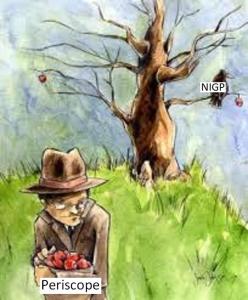“In order to give Customers using the Framework a balance between choice of suppliers and best value, following completion of the evaluation of tenders a maximum number of five suppliers will be awarded a position on the Framework. It is therefore vital that Tenderers can offer each of the five modules detailed on the following page. As referenced previously in this ITT it is anticipated Customers will elect to procure one or more modules or may choose to purchase a complete solution incorporating all of the five modules. It is therefore essential that Tenderers can offer all of the five modules to meet the requirements of those customers looking for a complete solution. Any Tenderer who cannot offer one or more of the elements listed above in 3.1 will be removed from this procurement process.”
The above is a quote from an invitation to tender by the UK public buying organisation (PBO), Eastern Shires Purchasing Organisation.
The modules, which represent a complete e-procurement solution, are e-tendering, e-evaluation, e-auctions, e-contract management, and e-vendor management. As stipulated, Tenderers have to offer all 5 modules or face being disqualified as a potential supplier. Unfortunately, it is this “all or nothing” approach that represents just one of the many obstacles that Small- Medium Enterprises or SMEs face in the pursuit of public sector business.
More to the point, the stipulation that Tenderers have to deliver all 5 modules, will eliminate or seriously impede the ability for the majority of SMEs to participate regardless of the superior capabilities of the modules they are able to provide. While I believe that this is an unintended consequence of a short-sighted approach, it nonetheless amounts to what could only be viewed as a discriminatory practice that will limit the pool of potential suppliers to the detriment of all involved – including the government itself.
Despite the government’s attempt to introduce reforms that would address the above challenge, the task for SMEs remains a difficult one.
In this context, I would like to take a moment to share with you the experience of my company, MarketDojo.
MarketDojo successfully applied for a grant from the Technology Strategy Board to develop a product to assist public procurement professionals with e-Sourcing activities.
While this support was greatly appreciated, once fulfilled we were for all intents and purposes on our own from that point onward. In essence and despite the government’s recognition that MarketDojo’s negotiating tool for running e-auctions and electronic request for quotations warranted financial support as it addressed “a particular problem area where frameworks have traditionally underperformed,” the method for actually utilizing our solution is hindered by the above mentioned all or nothing edict.
Simply put, and has demonstrated by the government grant, we believe that our product – and the complimentary products of other SMEs – can collectively save organisations a lot of money.
Even though we have made some progress in the public sector, having landed three government contracts, the private sector still represents the company’s best and most reliable opportunity for continued growth and long-term success. This leads one to wonder why SMEs are worthy of government funding but not considered to be worthy partners?
There are of course financial consequences associated with this disconnect.
For example, while both the transport team at Bedford Borough Council and Shropshire County Council have benefited greatly from their relationship with MarketDojo, Worcester County Council’s adoption of a more traditional contracting strategy meant that they ended up paying £2750 per e-auction, instead of the £500 for five that Market Dojo would have provided. This difference amounts to Worcester paying 27 times the price that neighbouring Shropshire County Council is paying per e-auction.
A further complication in terms of government achieving a best value outcome is the tendency on the part of local councils to interpret European Union tendering regulations differently from one another. Some interpretations as I have discovered, can lead to councils paying far too much for a less effective solution as a result of inflexible scoring mechanisms for evaluating tenders. In one instance it was suggested that if we redesigned our system to better mirror the specifications of the tender, we would have a better opportunity of winning the contract. Unfortunately, such an alteration would in reality eliminate the very functionality that led to the significant savings that were realized by both Bedford and Shropshire Councils. This again makes one wonder what it is that the government is attempting to accomplish, as there seems to be a greater emphasis placed upon following arbitrary regulations as opposed to driving greater value from procurement.
Needless to say, the combined outcome of all that I have covered above has led to a common complaint that far too many public sector procurement people hide behind rigid processes and procedures. This in my estimation, prevents public sector bodies from realizing maximum value for money in that they ultimately discriminate against SMEs and the innovative solutions they can provide.
30




piblogger
December 4, 2013
Reblogged this on Procurement Insights and commented:
Editor’s Note: While this article – written by a UK-based SME – speaks directly to the challenges associated with pursuing public sector business in the UK – is the pursuit of government contracts in North America a lost cause for the majority of SMEs?
Kelly Barner
December 5, 2013
Alun’s post makes two very interesting points, each of which stands on its own.
The first is the dilemma that arises when selection criteria requires that a single solution be able to support an entire process rather than specializing in one area – such as eAuctions in order to compete.
It reminds me of piece of advice I got when I first started skiing. I was in the process of selecting a pair of boots and observed to the sales person that if I got the ones I liked best I was going to look like a crazy person based on the color combination of my skis, poles, bindings, boots, etc. The sales person pointed out that serious skiers pretty much always clash due to the fact that they select the best piece of equipment in each category regardless of appearance. Being overly coordinated is the best way to be dismissed as someone trying to look more impressive than you really are.
I fully understand that this may have been a practiced sales technique, but the point stands nonetheless. You will rarely see the same strength across all functionality in a suite solution that you will see in a series of specialists offering each piece.
This is made all the more frustrating by the point that most large, end-to-end solutions were built through acquisition. And if you believe that the integration points between these solutions are as seamless on the back end as they are marketed to be, you are in for a big surprise during implementation. The decision each organization needs to make is what their technology requirements are: one with broad coverage but mediocre functionality or a portfolio of point solutions with leading capabilities.
The second question is whether public procurement will ever get out of their own way, learning to act in a way beneficial to constituents without every requirement becoming a matter of law.
Alun’s point about Market Dojo being worthy of a merit-based grant but not a contract reminds me of a post I wrote for the Procurement Insights US Edition about a public sector contract for marketing services here in my home state of Massachusetts. I’ll paste a link to the original post below, but the main point was that in order to be qualified for an award, every prospective supplier had to certify that the would subcontract some portion of the work (no matter how small) to a diversity supplier. One of the businesses was eliminated for not meeting this requirement, and no amount of explaining and protesting made it clear that since that company was certified woman-owned themselves, 100% of the business would be going to a diversity supplier – no subcontract needed.
Sigh…
If the UK public buying organization can’t see the value of what Market Dojo has to offer, their loss is the private sector’s gain!
How NOT to Follow a Strategic Sourcing Process, July 16, 2013
http://procureinsights.wordpress.com/2013/07/16/how-not-to-follow-a-strategic-sourcing-process-by-kelly-barner/
Market Dojo
December 5, 2013
Jon – Many thanks for letting us post. Kelly – We love the Ski analogy. We certainly see that there is so much innovation left to do in the eSourcing sector rather then immediately move out into P2P for example. We feel we can really make this best of breed. As for public procurement we find you just have to pick your tenders. Some use an appropriate process for the tender value and others not so. We hope that our solution will also help public procurement to be easier for suppliers and encourage adoption rather then exacerbate the current issues.
Ronald Duncan
December 7, 2013
This highlights two common issues in procurement.
One is the drive to rationalise suppliers so that their are less negotiations and thus get more all in one rather than specialist suppliers. It is the same for both public and private sector. e.g. The organisations that have focused on getting good deals with the 1,500 national suppliers. Where their competitors have the same or better deals with the 1,500 national supported by 5,000 regional and 12,000 local suppliers.
The other is discounting innovative solutions to put out tenders that multiple out of date solutions can meet. Tenders seldom look for the state of the art, they normally are copies of previous tenders that were created for a previous state of the art. This makes it much more difficult to sell in disruptive technology.
piblogger
December 8, 2013
Yet disruptive technology is what is needed, as the vast majority of major government projects fail to achieve the expected results.
Do you think this will change or perhaps a better question would be simply this . . . what will it take to stimulate the needed change?